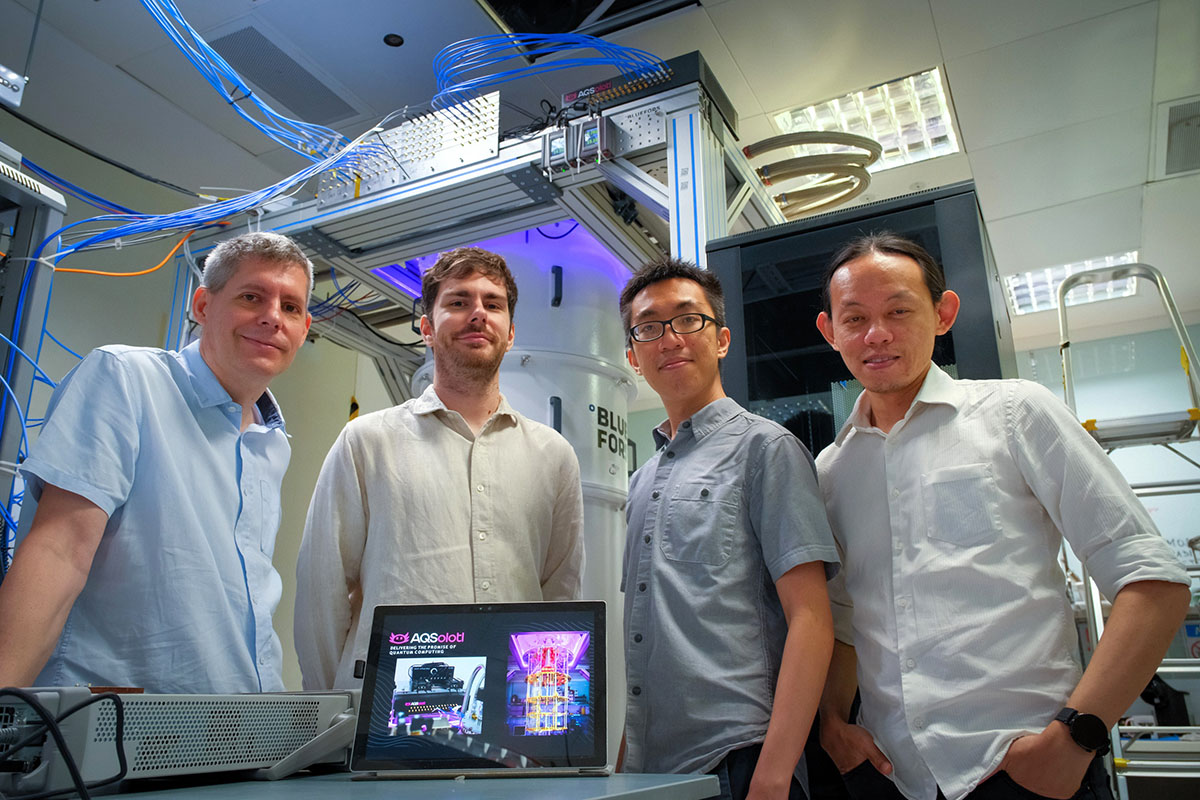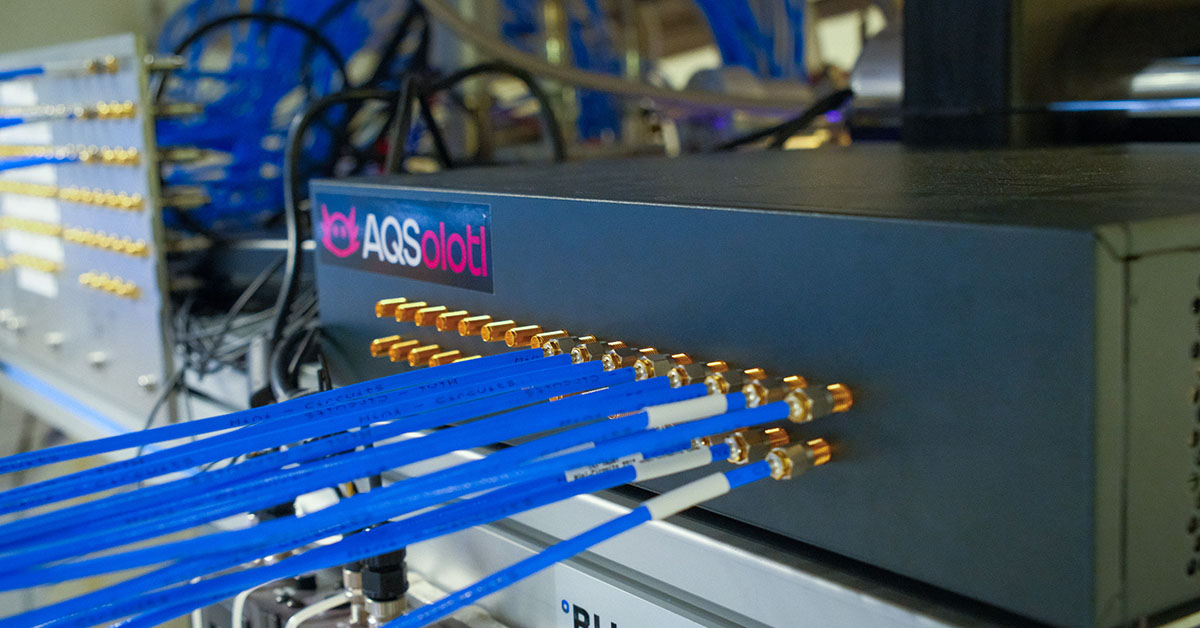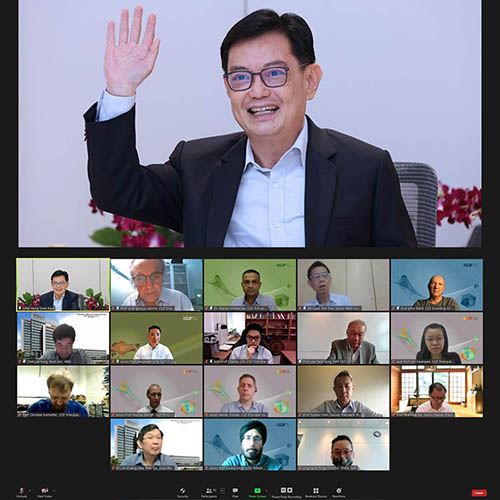Highlights
New spin-off AQSolotl debuts cost-efficient quantum controller
 Meet the co-founders of AQSolotl (left to right): CQT’s Rainer Dumke, Patrick Bore, a former CQT researcher who is now AQSolotl CEO, PhD student Paul Tan, and visiting researcher Yap Yung Szen. Not pictured is co-founder Marco Beckmann, entrepreneur.
Meet the co-founders of AQSolotl (left to right): CQT’s Rainer Dumke, Patrick Bore, a former CQT researcher who is now AQSolotl CEO, PhD student Paul Tan, and visiting researcher Yap Yung Szen. Not pictured is co-founder Marco Beckmann, entrepreneur.
CQT Principal Investigator Rainer Dumke has co-founded a spin-off called AQSolotl to commercialise quantum control technology developed by his team.
The spin-off was announced on 26 December in a joint press release by the new company, the National University of Singapore (NUS), and the Nanyang Technological University, Singapore (NTU Singapore), where Rainer holds a joint appointment as Associate Professor. Media including Channel News Asia, Quantum Insider and Lianhe Zaobao have reported on its launch.
The startup’s flagship product, CHRONOS-Q, is a quantum controller that acts as a translator between conventional computing systems and quantum computers.
When compared to competing quantum controllers, CHRONOS-Q excels in speed at a fraction of the cost and the size. For example, determining qubit states takes less than 14 nanoseconds enabling real-time feedback.
"This milestone exemplifies how cutting-edge academic research from leading institutes can lead to commercialisable deep tech innovations that benefit Singapore and beyond. With the founding of AQSolotl, we anticipate they will actively contribute back to the ecosystem and drive global advancements in quantum computing technologies," said Professor Chen Tsuhan, Deputy President, Innovation & Enterprise at NUS.
AQSolotl is led by Patrick Bore, co-founder and the company's CEO, who is a former CQT Research Associate. He said: “We are thrilled to take this step forward with the support of NTU and NUS, institutions renowned for their quantum research. Our CHRONOS-Q system demonstrates that quantum controllers can be both high-performing and cost-effective, paving the way for scalable applications across industries. We look forward to bringing real-world solutions to companies around the world, helping to advance quantum AI development and lower the barriers to entry for quantum computing.”
Quantum speed-ups
Quantum computers are theorised to be many thousands of times more powerful than today’s fastest silicon processors for some complex computational tasks, for example in cryptography and advanced simulation.
In the announcement, Rainer elaborated, “These quantum advancements could also enable us to address some of humanity's greatest challenges, including climate change and new emergent diseases, for instance, by accelerating the development of renewable energy systems and precision medicine.”
“How our efficient quantum technology can contribute, is to accelerate these developments and bring quantum computing to more spaces at cost-effective prices, so that quantum computing can become mainstream and accessible for most countries and not just for wealthy nations,” he said. At AQSolotl, Rainer takes the role of Scientific Advisor.
Rainer and Patrick's other co-founders are CTO Yap Yung Szen, a visiting researcher from the Universiti Teknologi Malaysia, Head of Quantum Algorithms Paul Tan, a PhD student, and Strategic Advisor Marco Beckmann, an entrepreneur and venture capitalist from Germany.
In control
Developed and refined over three years, the control technology is currently being piloted at CQT as part of the hardware setup for the National Quantum Computing Hub and at NTU’s Nanyang Quantum Hub.
 The controller is designed to scale easily, has customisable and upgradable firmware, and can integrate additional modules in future. It integrates control and read-out for qubits using field programmable gate arrays. The team described the approach in a 2022 paper in Review of Scientific Instruments.
The controller is designed to scale easily, has customisable and upgradable firmware, and can integrate additional modules in future. It integrates control and read-out for qubits using field programmable gate arrays. The team described the approach in a 2022 paper in Review of Scientific Instruments.
As part of the commercialisation process, the intellectual property (IP) for the technology has been transferred to AQSolotl, with both NTU and NUS taking equity shares in the company, while retaining rights for academic, research, and non-commercial use.
The startup is currently supported and incubated by the NTU Innovation and Entrepreneurship (NTU I&E) initiative.
Professor Louis Phee, Vice President (NTU Innovation & Entrepreneurship), said, "NTU's I&E initiative is committed to supporting deep tech, such as quantum technologies, that has potential for significant impact. Through our venture-building programmes, we work closely with faculty and researchers to refine their business models, scale their prototypes, and bring their innovations to market.”
The team’s ambitions reach beyond bringing the control technology to market. The company is raising funds for its next steps: to enable AI integration and offer customised solutions for companies wishing to buy their own cost-effective full quantum computing system.
There are now about ten quantum startups in Singapore, with eight including AQSolotl having connections to CQT through their technology or founders. (See our spin-offs and startups listing.)
This text is adapted from the press release available at www.ntu.edu.sg/news/detail/cutting-edge-quantum-control-technology-commercialised
Learn more
Related Stories
 | Singapore’s quantum ecosystem gets a boost from three national platforms May 31 2022 |
 | Singapore’s Deputy Prime Minister Heng Swee Keat virtually visits CQT June 23 2021 |






